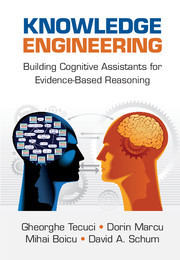Description
Knowledge Engineering
Building Cognitive Assistants for Evidence-based Reasoning
Authors: Tecuci Gheorghe, Marcu Dorin, Boicu Mihai, Schum David A.
Using robust software, this book focuses on learning assistants for evidence-based reasoning that learn complex problem solving from humans.
Language: English
Subject for Knowledge Engineering:
91.52 €
In Print (Delivery period: 14 days).
Add to cart
Publication date: 09-2016
480 p. · 18.3x26.2 cm · Hardback
480 p. · 18.3x26.2 cm · Hardback
Description
/li>Contents
/li>Biography
/li>
This book presents a significant advancement in the theory and practice of knowledge engineering, the discipline concerned with the development of intelligent agents that use knowledge and reasoning to perform problem solving and decision-making tasks. It covers the main stages in the development of a knowledge-based agent: understanding the application domain, modeling problem solving in that domain, developing the ontology, learning the reasoning rules, and testing the agent. The book focuses on a special class of agents: cognitive assistants for evidence-based reasoning that learn complex problem-solving expertise directly from human experts, support experts, and nonexperts in problem solving and decision making, and teach their problem-solving expertise to students. A powerful learning agent shell, Disciple-EBR, is included with the book, enabling students, practitioners, and researchers to develop cognitive assistants rapidly in a wide variety of domains that require evidence-based reasoning, including intelligence analysis, cybersecurity, law, forensics, medicine, and education.
1. Introduction; 2. Evidence-based reasoning: connecting the dots; 3. Methodologies and tools for agent design and development; 4. Modeling the problem-solving process; 5. Ontologies; 6. Ontology design and development; 7. Reasoning with ontologies and rules; 8. Learning for knowledge-based agents; 9. Rule learning; 10. Rule refinement; 11. Abstraction of reasoning; 12. Disciple agents; 13. Design principles for cognitive assistants.
Gheorghe Tecuci (PhD, University of Paris-South and Polytechnic Institute of Bucharest) is Professor of Computer Science and Director of the Learning Agents Center at George Mason University, Virginia, Member of the Romanian Academy, and former Chair of Artificial Intelligence at the US Army War College. He has published 11 books and more than 190 papers.
Dorin Marcu (PhD, George Mason University) is Research Assistant Professor in the Learning Agents Center at George Mason University, Virginia. He collaborated in the development of the Disciple Learning Agent Shell and a series of cognitive assistants based on it for different application domains, such as Disciple-COA (course of action critiquing), Disciple-COG (strategic center of gravity analysis), Disciple-LTA (learning, tutoring, and assistant), and Disciple-EBR (evidence-based reasoning).
Mihai Boicu (PhD, George Mason University) is Associate Professor of Information Sciences and Technology and Associate Director of the Learning Agents Center at George Mason University, Virginia. He is the main software architect of the Disciple agent development platform and coordinated the software development of Disciple-EBR. He has received the IAAI Innovative Application Award.
David A. Schum (PhD, Ohio State University) is Emeritus Professor of Systems Engineering, Operations Research, and Law, as well as Chief Scientist of the Learning Agents Center at George Mason University, Virginia. He has published more than 100 research papers and 6 books on evidence and probabilistic inference, and is recognized as one of the founding fathers of the emerging Science of Evidence.
Dorin Marcu (PhD, George Mason University) is Research Assistant Professor in the Learning Agents Center at George Mason University, Virginia. He collaborated in the development of the Disciple Learning Agent Shell and a series of cognitive assistants based on it for different application domains, such as Disciple-COA (course of action critiquing), Disciple-COG (strategic center of gravity analysis), Disciple-LTA (learning, tutoring, and assistant), and Disciple-EBR (evidence-based reasoning).
Mihai Boicu (PhD, George Mason University) is Associate Professor of Information Sciences and Technology and Associate Director of the Learning Agents Center at George Mason University, Virginia. He is the main software architect of the Disciple agent development platform and coordinated the software development of Disciple-EBR. He has received the IAAI Innovative Application Award.
David A. Schum (PhD, Ohio State University) is Emeritus Professor of Systems Engineering, Operations Research, and Law, as well as Chief Scientist of the Learning Agents Center at George Mason University, Virginia. He has published more than 100 research papers and 6 books on evidence and probabilistic inference, and is recognized as one of the founding fathers of the emerging Science of Evidence.
© 2024 LAVOISIER S.A.S.

